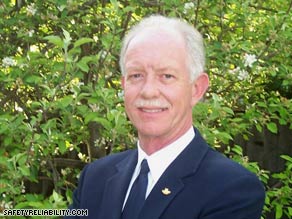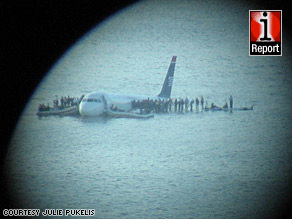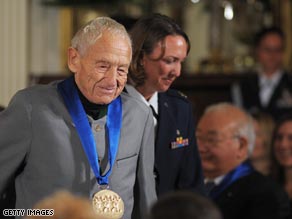(CNN) -- Passengers on the US Airways flight that crash-landed into the Hudson River Thursday afternoon praised the actions and courage of the pilot, a safety consultant with 40 years of experience in the aviation industry.

Chesley B. "Sully" Sullenberger, a former Air Force fighter pilot, has been with US Airways since 1980.
Sources tell CNN that Chesley B. "Sully" Sullenberger was piloting US Airways flight 1549 from New York's LaGuardia airport to Charlotte, North Carolina, when at least one of the plane's engines failed.
Passenger Jeff Kolodjay offered "kudos" to Sullenberger for a landing that minimized damage to the aircraft and its 155 passengers and crew.
"All of a sudden the captain came on and he told us to brace ourselves and probably brace ourselves pretty hard. But he did an amazing job -- kudos to him on that landing," said Kolodjay, who was sitting in seat 22A.
Sullenberger's wife told CNN that she was stunned to hear the news from her husband after it was all over.
"I hadn't been watching the news. I've heard Sully say to people, 'It's rare for an airline pilot to have an incident in their career,' " said Lori Sullenberger of Danville, California.
"When he called me he said, 'There's been an accident.' At first I thought it was something minor, but then he told me the circumstances and my body started shaking and I rushed to get our daughters out of school."
US Airways said all 155 passengers and crew are alive and safely off the plane.
The crash-landing has also earned the former fighter pilot and private safety consultant accolades from state and government officials.
New York Mayor Michael Bloomberg commended the pilot for not leaving the plane without checking to make sure every passenger had been evacuated.
"It would appear that the pilot did a masterful job of landing the plane in the river and then making sure that everybody got out," Bloomberg said at a press conference Thursday.
Don't Miss
"I had a long conversation with the pilot. He walked the plane twice after everybody else was off and tried to verify that there was nobody else on board -- and assures us there was not."
Sullenberger apparently was forced to make an emergency landing after geese were sucked into one or both of the jet's engines. An eyewitness working on the west side of Manhattan said the belly of the plane touched the water first.
An official who heard tape recordings of the radio traffic from Flight 1549 reported the pilot was extraordinarily calm during the event.
"There was no panic, no hysterics," the official said. "It was professional, it was calm, it was methodical. It was everything you hoped it could be."
The pilot and air traffic controller discussed options, including landing at Teterboro airport in New Jersey, the official said. Then there was a "period of time where there was no communications back, and I'm assuming he was concentrating on more important things."
Sullenberger's background in aviation appeared to have prepared him for such a situation.
He has been a pilot with US Airways since 1980, following seven years in the U.S. Air Force.
His resume -- posted on the Web site for his safety consulting firm, Safety Reliability Methods, Inc. -- lists piloting procedures, technical safety strategies, emergency management and operations improvement, as areas of industry expertise.
He served as an instructor and Air Line Pilots Association safety chairman, accident investigator and national technical committee member, according to a biography on the site. He participated in several USAF and National Transportation Safety Board accident investigations, and worked with NASA scientists on a paper on error and aviation, his site says.
For the passengers on flight 1549, Sullenberger's skill and expertise were apparent. iReport.com: Did you see the crash-landing? Send images
"I've flown in a lot of planes and that was a phenomenal landing," said passenger Fred Berretta said.
Berretta was sitting in seat 16A right over one of the engines when it failed and the pilot turned the plane to align it with the Hudson River. He described silence in the plane as the passengers waited to hear from the crew.
A few moments later, the direction to brace for landing came.
"It was an amazing piece of airmanship," said Peter Goelz, a former NTSB managing director.NEW YORK (CNN) -- The pilot aboard U.S. Airways Flight 1549 came over the speaker system and told passengers "brace for impact." One passenger turned on his cell phone so his body could be found with its GPS tracking. Others reflected on their lives.

Unbelievable
iReporter Julie Pukelis used a camera and a telescope to get this view of the crash scene on the Hudson River.
Survivors said it was about 20 seconds later when the plane struck the water of the Hudson River on Thursday afternoon.
Each of them lauded the heroics of the pilot, Chesley B. "Sully" Sullenberger III.
Here are survivor accounts in their own words: ![]() Watch message to pilot: "I'll buy you a beer" »
Watch message to pilot: "I'll buy you a beer" »
Vince Spera
"He's the man! He's absolutely the man. ... If you want to talk to a hero, get ahold of him because that is the hero in this whole deal."
Spera descibed "the moment of impact": "Have you ever been in a speedboat and hit some wake? That's what it felt like, when you go over the wake and you hit the water again. ... It wasn't that bad of an impact, which was strange. And then after that, there wasn't a lot of yelling and screaming. It was fairly orderly getting off the plane."
Andrew Jamison
"God was certainly looking out for all of us." ![]() Watch one decribe how "the engine blew" »
Watch one decribe how "the engine blew" »
Brad Wentzell
Wentzell cried when talking about returning home to snuggle with his young daughter. "When I get home, I am going to take my nose and put it by her ear, her little warm body and give her a nice kiss from Daddy. I'm alive. That's it. I don't have much else to say."
Don't Miss
"We have a second chance in life." ![]() See photos of the "Miracle on the Hudson" »
See photos of the "Miracle on the Hudson" »
Carl Bazariane
"We were all looking to see how we were gonna die. It was really strange."
On the crash landing, he said, "Usually in moments like that, you would expect chaos. It got really quiet and nobody said a word. There was a child crying. That was about it. That was understandable."
Joe Hart
He said passengers didn't panic on the plane. It was only after the crash when things got chaotic, he said. "It's when we got outside and in the cold water. And I mean the water was cold. Within seconds, my legs were numb, standing in the cold water." ![]() See a map of where the plane went down »
See a map of where the plane went down »
"We're just happy to be around. We're just happy to be around."
Jeff Kolodjay
"The plane started filling with water pretty quick. ... It was scary. There was a lady with her baby on my left-hand shoulder, and she was crawling over the seats."
Alberto Panero
On the "brace for impact" moment: "That's the only thing that was said. I guess that's probably a better thing so that people didn't panic. But at the time, he said it so calmly. From that point until we hit the water, it was pretty quick."
He said he turned on his cell phone before impact so that his body could be found via GPS.
Panero added, "We just hit, and somehow the plane stayed afloat, and we were able to get on the raft. It's just incredible right now that everybody's still alive."
Fred Berretta
"I think a lot of people started praying and just collecting themselves," Berretta said. "It was quite stunning." He said he was expecting the plane to flip over and break apart, but it didn't. "It was a great landing," he said.




